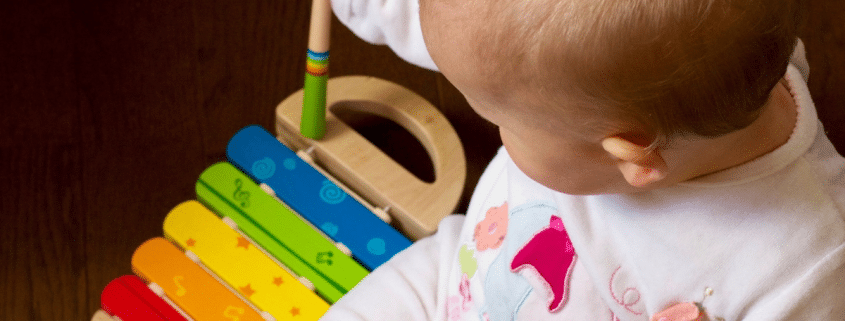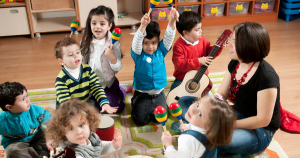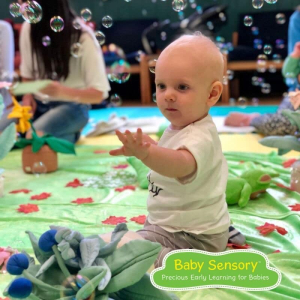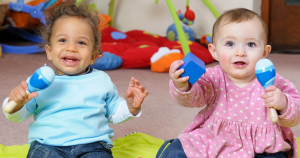Musical Development in the Early Years
By Danielle Ballantine-Drake 2023
Have you ever wondered about things like how much your baby understands you, or when they are most likely to enjoy peek-a-boo games and tickles, or when they might enjoy moving to music? Individuals will develop at their own pace, but the following information gives you a rough guide to what to expect with their listening and musical skills:
In Utero – yes, they can hear you before they are born!
- At 9 weeks indentations appear where the ears will grow.
- About 18 weeks a baby can start to hear sounds.
- About 24 weeks they become more sensitive to sounds.
- From 25 weeks they may respond to voices and sounds, so you can try singing songs or reading a simple repetitive story.
Newborn – soothing and familiar!
- From birth babies can recognise sounds they heard in the womb and will be soothed by familiar sounds.
- They will be startled by a loud or sudden sound, so it is best to keep things gentle e.g., your own songs and humming.
1 to 3 Months – where is that sound?
- Babies may start to respond to the sound of your voice by smiling, moving arms and legs, or turning their heads towards the source.
- They may begin to vocalise babbling and cooing sounds like “Aaah”, “Eee” and “Ooo”.
- Around 3 months they may notice that some toys make sounds and may become interested in grasping and shaking things that make noise.
4 to 6 Months – tickles!
- Babies may begin to understand cause and effect i.e., they may realise that they have caused the rattle to make a noise by shaking it.
- Around 5 months babies will become more interested in colours and may enjoy choosing from a selection of colourful instruments.
- Around 6 months babies may start to become ticklish, so tickling game-songs can be especially fun.
- Around 6 months they start imitating sounds and repeating favourite sounds like ‘baba’, ‘dada’, ‘gaga’ or ‘mama’.
7 to 9 Months – babbling and boo!
- Many babies really find their voice and start babbling away. They may be interested in imitating silly sounds you make, for example animal noises like ‘moo’ or ‘quack’.
- Babies are likely to respond to their own name (so it is fun to include their name in your songs).
- Babies begin to distinguish emotions from the tone of your voice.
- Babies may start to watch your mouth and lips more closely and experiment with high and low sounds.
- As soon as your baby is secure sitting up, they are likely to enjoy moving to the beat when listening to music.
- Around 8 months babies start to understand object permanence (before this they think things don’t exist if they can’t see them) so peek-a-boo games and songs become interesting.
- Around 9 months your baby may begin to anticipate the order of events, so songs with a tickle at the end are perfect e.g., Round and Round the Garden.
10 to 12 Months – clapping!
- Some babies may be able to clap or wave now, so might join in with simple action songs.
- Lots of babbling and experimenting with new sounds will continue.
- Interestingly, between 10- and 12-months babies lose the ability to hear all sounds and begin to specialise and tune in only to the sounds of their native language.
13 to 15 Months – actions!
- Most babies love repetition at this stage and will join in with familiar action songs.
- This is often a good time to learn to point to body parts, so the song ‘Head, Shoulders, Knees and Toes’ is perfect.
- Babies will usually understand a great many words even though they cannot yet say them.
16 to 18 Months – moving!
- Many toddlers can say some words at this stage, and they will attempt to join in if you sing familiar repetitive songs.
- They may develop a keen interest in watching what other children and babies are doing so might enjoy a group music session.
19 to 24 Months – jumping!
- Some children are able to jump at this stage and will enjoy songs that involve jumping such as ‘Five Little Monkeys’ or ‘Sleeping Bunnies’.
- Some children begin to hum or sing familiar tunes around this age.
- They might also be able to have a go at skills like brushing their teeth and washing their hands, which can be made extra fun with a song!
What does all that mean for me and my baby?
Every child is born well prepared for musical experience, with the ability to perceive and process fundamental musical qualities, as well as a strong motivation for vocal play. Babies develop at their own pace, so when you choose activities and songs always be guided by what they enjoy and try to let them guide you as to when it is time to stop. If they are engaged and looking at you then that’s a great sign to continue, but if they are looking away then they may have had enough for now. Your little one is likely to develop favourite songs and games at different stages of their development, so it is always good to experiment and to try different things with them to see what works best. Happy singing!
Danielle Ballantine-Drake (MA, PGCE, BSc) is Head of Early Years & Voice at Berkshire Music Trust. She specialises in teaching music for 0-7 year olds and wants every child to feel the benefits of singing from an early age. Danielle has taught for over 20 years in a variety of schools, nurseries, and community settings, and she regularly leads training for EY practitioners.


















